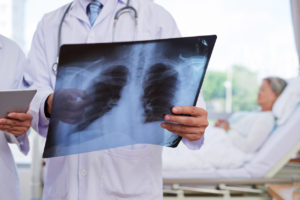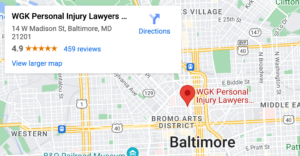
Chest injuries can happen in almost any accident. One of the most common causes of chest trauma is car accidents. Ironically, the airbag and seat belt that could save your life in a crash could also fracture your ribs.
Your ribs protect your lungs and heart. They also protect the major blood vessels that supply blood to your brain and body. The consequences of a chest injury can range from bruises to a fatal heart or lung injury.
Below, we’ll discuss chest injuries and the compensation you can obtain for their effects.
Table of Contents
How Do Chest Injuries Happen?
Chest injuries usually come from chest trauma. Chest trauma can take a few different forms, including:
Blunt Force Trauma
Blunt force trauma happens during a collision between an object and the chest. The skin is not penetrated in this kind of event. However, blunt force trauma can fracture ribs and bruise the chest. Blunt force trauma over time can crush organs or cause suffocation.
Penetrating Trauma
Penetrating trauma occurs when a foreign object penetrates the chest. If the object passes into the chest cavity, it can penetrate the lungs, heart, or major blood vessels.
Blast Trauma
Blast trauma results from the pressure wave created by an explosion. The pressure wave can damage a person’s lungs without injuring their chest. Instead, the rapid and drastic change in air pressure compresses the lungs or causes them to over-expand.
What are the Different Types of Chest Injuries?
Chest trauma can damage the musculoskeletal system, circulatory system, or pulmonary system.
Some of the most common chest injuries that can result from chest trauma include:
Fractured Ribs
The ribs encircle the heart and lungs. You have twelve ribs on each side of your chest. The top seven ribs attach to your spine and your sternum. Doctors call ribs eight through ten “false ribs” because they only attach to the sternum. Doctors refer to ribs eleven and twelve as “floating ribs” because they only attach to the spine.
Chest trauma can overwhelm the strength of the ribs and fracture them. Trauma can also tear the cartilage in the ribs or the ligaments that attach the ribs to the spine.
The danger of fractured or dislocated ribs is that the ribs can puncture the lungs, the heart, or the fibrous tissues that protect them. This can cause death.
Cardiac Tamponade
The pericardium is a fibrous sac that protects the heart. Cardiac tamponade happens when the pericardium fills with fluid. This inhibits the heart from beating and can result in death if doctors cannot drain the fluid.
Cardiac tamponade can result from penetrating chest injuries that damage the pericardium and allow fluid to build up inside.
Pneumothorax
Pneumothorax happens when a penetrating chest wound allows air to accumulate in the space surrounding the lungs. The pressure of the air prevents the lungs from expanding.
As a result, the patient can suffocate unless doctors suck the air from the chest and repair the wound.
Pulmonary Embolism
Blunt trauma can cause internal bleeding. Blood clots can block the blood vessels of the lungs. This blood clot can damage the lungs or even cause death.
Ruptured Aorta
The aorta carries blood from the heart to the rest of the body. A ruptured aorta can cause death within minutes due to excessive blood loss.
What are the Risk Factors for Chest Injuries?
Chest trauma can result from almost any type of accident. Some of the more common causes of chest trauma include:
Falls
Falls are the most common cause of emergency room visits. Slip and falls and falls from a height can result in chest injuries when a person strikes the ground as they fall. You could also suffer a chest injury if you strike an object as you fall, including scaffolding, a ladder, railing, or a fence.
Workplace Accidents
Workplace accidents can produce chest injuries in the form of falls. Workplaces also have other hazards that can cause chest injuries, including vehicles, sharp tools, and falling objects.
Workers who use explosives, such as miners and demolition workers, can sustain chest injuries from blast trauma. Workers who use large machines, such as construction and factory workers, can suffer chest injuries when they get crushed or trapped in machinery.
Car Accidents
Car accidents often cause chest injuries. Drivers who wear seat belts can suffer bruising, dislocated ribs, or fractured ribs when the seat belt restrains the chest. Drivers who do not wear seatbelts can strike their chest on the steering wheel, airbag, or side door in a collision.
Bicycle and Pedestrian Accidents
Victims of bicycle accidents and pedestrian accidents can suffer a chest injury when a vehicle strikes them. They can also sustain a chest injury when they hit the ground.
What Compensation Can I Recover for a Chest Injury?
The compensation you can recover for a chest injury will depend on the circumstances of your accident.
If you were injured on the job, workers’ compensation might provide your exclusive remedy. Your workers’ compensation benefits include 100% of your medical bills and partial income replacement while you recover from your chest injury.
Suppose you were injured due to the negligence of a person or business. In that case, you can seek compensation for all of your medical expenses, as well as any lost income and pain and suffering.
In most cases, you will first seek compensation through an insurance claim. Motorists, businesses, and homeowners usually have liability insurance that compensates victims of the insured’s negligence.
A severe chest injury will often justify substantial compensation. You might face large medical bills to treat a heart or lung injury. These injuries could also keep you from working or even force you to retire. You can include your lost income and diminished earning capacity in your injury claim.
Chest injuries can also justify non-economic damages. These damages compensate you for the impact of your injuries on your life. They include such losses as physical pain, mental suffering, inconvenience, and loss of activities.
You can use any evidence that your chest injury diminished your quality of life to prove non-economic damages.
Contact a Baltimore Personal Injury Lawyer for Help
When you’ve been injured because of someone else’s negligence, you deserve compassionate representation and adequate compensation for your injury. A qualified Baltimore personal injury attorney can help you to achieve both.
Want to learn more about the compensation you can obtain for your chest injury? Contact WGK Personal Injury Lawyers for a free, no-obligation consultation. During your consultation, we’ll talk through the circumstances of your injury and explore your next best steps to pursue justice.


